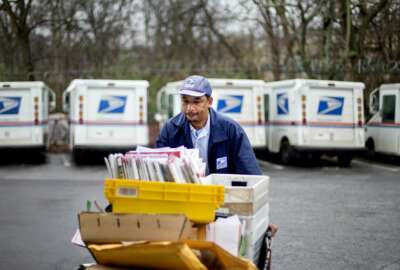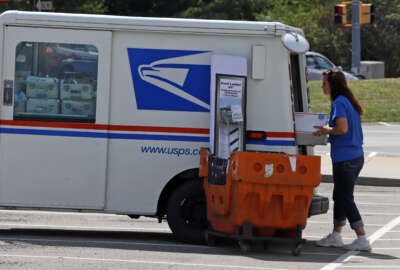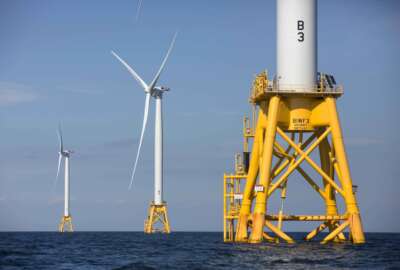House Democrats press USPS to make bigger commitment on electric vehicles
A coalition of House Democrats is joining the Biden administration in pressing the Postal Service to make a larger commitment to electric delivery vehicles in the...
A coalition of House Democrats is joining the Biden administration in pressing the Postal Service to make a larger commitment to electric delivery vehicles in the coming years.
The leaders of the House Sustainable Energy and Environment Coalition sent a letter to Postmaster General Louis DeJoy on Wednesday, warning that the agency’s current plans for its next-generation delivery vehicle would scuttle the Biden administration’s goal of achieving net-zero greenhouse gas emissions across all federal operations by 2050.
USPS said in a statement last Sunday that it plans to buy 5,000 electric vehicles as part of its initial order to Oshkosh Defense. The agency said it has the flexibility to increase the total number of electric vehicles, “should additional funding become available.”
The agency expects, at minimum, that electric vehicles will make up 10% of its next-generation delivery vehicle fleet.
The lawmakers warn that any fossil fuel-powered vehicles purchased now will “lock-in emissions potentially past 2050,” the date at which President Joe Biden set a target to reach net-zero emissions across the entire federal government, including USPS.
“This is why President Biden moved aggressively in his first year to establish clean federal procurement standards, particularly around the federal vehicular fleet, because he and his administration understand that the decisions we make today will have a long-lasting impact,” the lawmakers wrote.
The letter includes signatures from coalition co-chairs Reps. Gerry Connolly (D-Va.), Doris Matsui (D-Calif.), and Paul Tonko (D-N.Y.).
It was also signed by the coalition’s vice-chairs Rep. Matt Cartwright (D-Pa.), Alan Lowenthal (D-Calif.) A. Donald McEachin (D-Va.), Chellie Pingree (D-Maine) and Mike Quigley (D-Ill.)
The coalition, created in January 2009, includes 71 House members.
DeJoy told the USPS Board of Governors on Tuesday that the agency’s proposed level of commitment to purchase electric vehicles “is frankly ambitious, given the pressing vehicle and safety needs of our aging fleet and our dire financial condition.”
USPS would have received $6 billion in the Build Back Better Act to invest in more electric vehicles and the necessary infrastructure to charge them. The spending package, however, doesn’t have enough support in the Senate and is unlikely to pass in its current state.
“We cannot at this time count on additional funding, and in our current state we have to be mindful of what we can afford, and to recognize that the total cost of ownership for electric vehicles is substantially higher than vehicles with fuel-efficient internal combustion engines, particularly considering the electric vehicle infrastructure that we would have to build-out and fund,” DeJoy said.
The lawmakers told USPS they are “well aware of the fiscal constraints of the Postal Service,” and are “sympathetic to those limitations.”
“But even without these investments and financial relief, we urge you to consider what is in the long-term economic best interests of the Postal Service,” they wrote.
The House, meanwhile, on Tuesday passed the Postal Service Reform Act, a major postal reform bill that would forgive USPS $57 billion in defaulted payments to its retiree health fund.
The bill is also projected to save USPS an additional $50 billion over the next decade, by requiring all future postal retirees to enroll in Medicare and eliminating a 2006 requirement for USPS to pre-fund its retiree health benefits well into the future.
USPS ended 2021 with more than $23 billion in cash.
The Biden administration, earlier this month, warned it may hold up the Postal Service’s next-generation vehicle fleet plans, over concerns that the agency isn’t doing enough to reduce greenhouse gas emissions.
The White House Council on Environmental Quality and the Environmental Protection Agency, in separate letters to USPS, said the agency’s environmental review of its next-generation delivery vehicle contract does not give a full accounting of the expected environmental impact.
The lawmakers are backing CEQ and EPA’s request for USPS to prepare a supplemental Environmental Impact Statement that incorporates “more up-to-date information on electric vehicle technology, cost, and deployment, as your competitors already do.”
They also support CEQ’s request to USPS to work with Oshkosh Defense to “maximize feasible electric vehicle production.”
“Failing to take these actions would put the Postal Service at serious legal risk,” the lawmakers said.
DeJoy said USPS is committed to completing the National Environmental Policy Act (NEPA) process for its next-generation vehicle fleet, adding that the agency is “compelled to act prudently in the interests of the American public.”
“However, that responsibility should not be mistaken for an ambivalent commitment to operating a cleaner Postal vehicle fleet for our country,” DeJoy said.
USPS has faced several challenges to its next-generation vehicle contract award to Oshkosh Defense.
Workhorse Group, an electric vehicle company on the Postal Service’s shortlist to manufacture its next-generation delivery vehicle fleet, filed a bid protest against the agency last year, arguing that USPS “put its thumb on the scale against Workhorse” and took its prototype out of consideration over a “safety incident” caused by a USPS test track driver’s error.
Workhorse, however, withdrew its bid protest last September, a day before oral arguments were scheduled before the U.S. Court of Federal Claims.
USPS expects next-generation delivery vehicles will arrive on delivery routes starting in 2023.
DeJoy, meanwhile, said the agency has an “urgent need” to replace its 30-year-old delivery vehicles that “are powered by inefficient gasoline engines and that lack modern day safety features.”
“We are confident that our Next Generation Delivery Vehicle program (NGDV) will introduce vehicles that are much safer and significantly more environmentally friendly than the vehicle fleet we operate today,” he said.
Copyright © 2024 Federal News Network. All rights reserved. This website is not intended for users located within the European Economic Area.
Jory Heckman is a reporter at Federal News Network covering U.S. Postal Service, IRS, big data and technology issues.
Follow @jheckmanWFED






